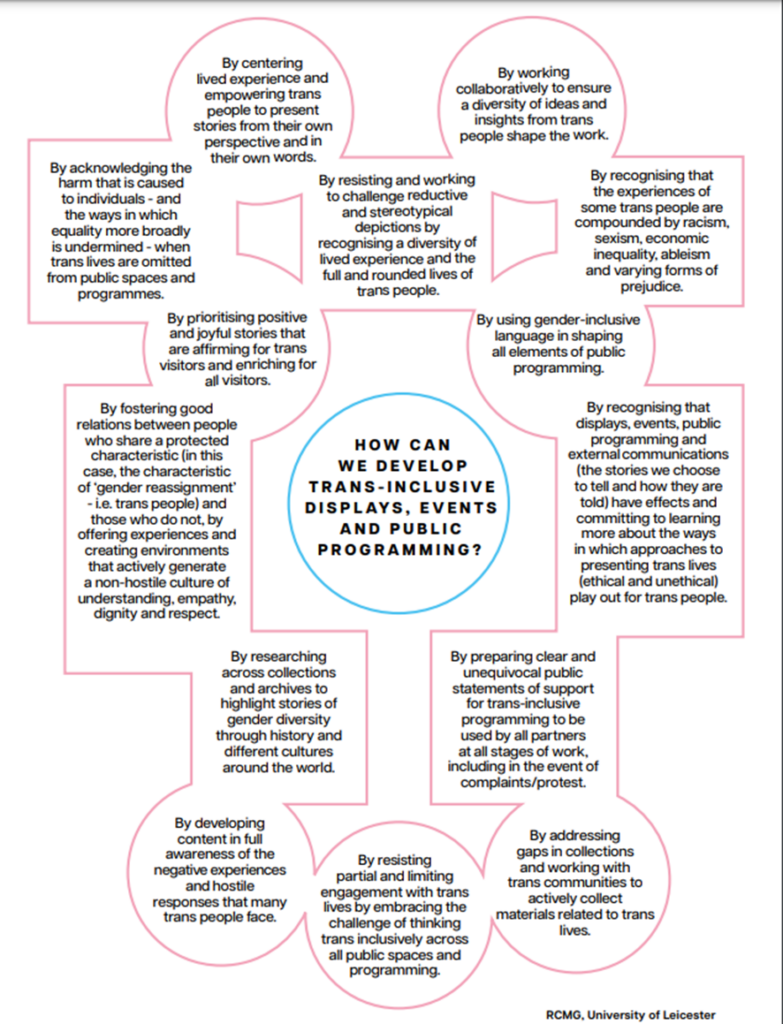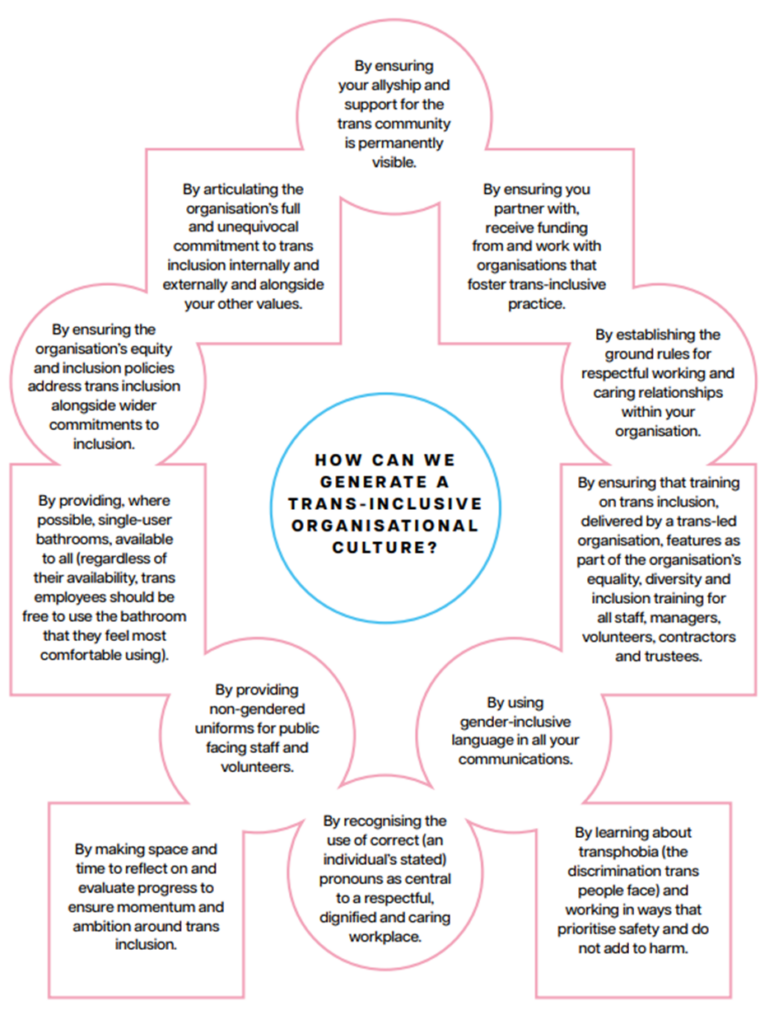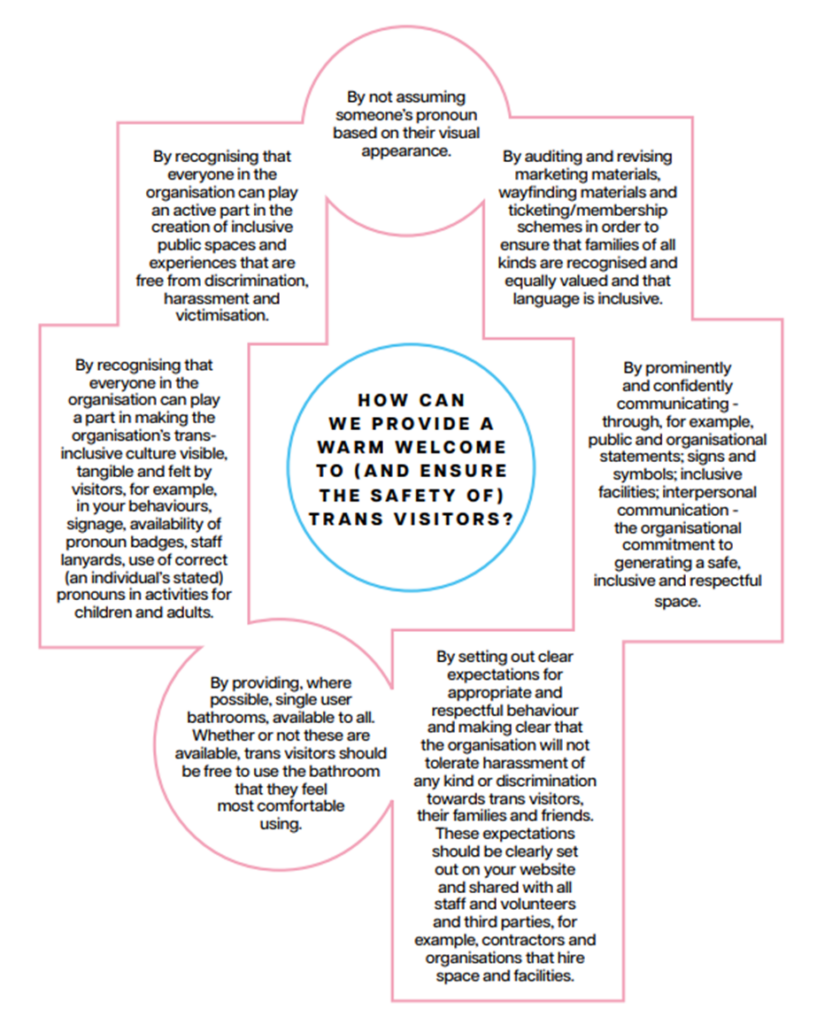Academics at the University of Leicester have devised guidance to help museum and gallery bosses “advance trans inclusion”. They were assisted by Stonewall, Gendered Intelligence and other gender ideology charities and organisations. The work was paid for by taxpayers via funding from the Economic and Social Research Council, which is part of the ‘UK Research & Innovation’ (UKRI) quango.
Newspaper coverage of the report focused on the usual promotion of ideology and pseudoscience that we have come to expect from organisations right across our public sector, and which we seem powerless to challenge.
According to the Telegraph, for example, the guidance:
- states that museums should “stimulate positive explorations of gender” for children. (So the authors ‘want’ more kids to feel discombobulated in their bodies?)
- says that kids and adults “should be provided with access to the toilets and changing rooms of their choice”. (So the dignity, privacy, safety of both sexes should be ignored?)
- suggests using “gender-inclusive language in all communications”. (Why on earth do these lobby groups think they have a right to change how we have spoken for millenia?)
This is the usual ideological agenda that we now expect from such lobby groups – and which our entire public sector has become the mouthpiece for.
However, there is something different about the trans museum guidance which is useful and which points a way towards us digging ourselves out of the gridlock we have got into with respect to gender ideology. Public sector trans policies, pronouncements and edicts tend to provide little in the way of rationale. They simply declare into place an edifice of requirements at the same time as making clear that anyone who objects is transphobic.
Imagine if you went into work one day and saw this notice pinned on the wall: “Here is a new requirement and if you object to it you are hateful and your job is at risk.” That’s a closed loop brooking no dissent, and it is an accurate picture of the state we are in.
The trans museum guidance breaks open this closed loop. It describes in detail the legal basis on which it justifies the promotion of gender ideology. It presumably exposes the sort of conversations that go on inside the EDI wings of the HR departments that loom large, and ever larger, across our public sector. “Why are we doing this again?” “PSED, dear”.
As the trans museum guidance explains, the Equality Act 2010 contains a “Public Sector Equality Duty” (PSED) at section 149. This is how the guidance explains and interprets it:

It is the “duty to advance inclusion” that is doing so much of the work. It’s funny because these words are missing from Section 149.
Many people would argue that this section of the Equality Act is currently being over-interpreted by empire-building ideologically-motivated EDI departments. But is it really? Read key bits again:

Frankly, I am surprised that we are in as good shape as we are. With a classical liberal set of glasses on you can read this section as simply requiring us to take care that we set up level playing fields. But put on a pair of critical-theory specs and an interpretation in favour of activism, a “duty to advance inclusion” is not hard to see.
Here is how the trans museum guidance does it. Firstly it ramps up its application:
Compliance with the general equality duty is a legal obligation and it will require forward planning so that consideration is given to the most effective ways in which all protected characteristic groups can generally be included in any services or activities offered. (emphasis mine).
Then it switches it to being about environments, which sort of cover everything. Of course, with the usual threat.
This allows cultural organisations to be proactive in publicly promoting trans-inclusive environments. Organisations such as museums that are not trans-inclusive could be discriminating against individual staff and customers, and creating a trans-inclusive organisation (for example, by adopting trans-inclusive policies and guidance that cover harassment and bullying against trans people) does not conflict with equality duties to prevent discrimination against (or foster inclusiveness for) any other protected characteristic group.
However, compared to what is to come, this language is still relatively mild. The trans museum guidance then ramps up the Public Sector Equality Duty into permanent revolution. It must be all the time, with respect to everything.
Please read this below:

Gender ideology must permeate everything. It must be permanently visible. Nothing escapes – uniform, toilets, volunteers, kids, partner organisations, suppliers, culture, collections, displays, events, public programming, language. Language, language, language. You would not think we are a sexed species. You would not think that sex matters to women – and to men. You would not think that we do not have coerced speech or belief in country. You would not think that Maya Forstater won her case and that gender critical beliefs are protected in the workplace.
Please read this below. See the top circle. The revolution must be all pervasive:

Please read this below. See the top circle. Reality must be undermined.

Of course, it is all ludicrous. But it is real, happening, and causing immense damage. Gender ideology is being promoted right across our public institutions. Vulnerable people are being harmed, permanently. But it is not just a minority issue harming a few. We shouldn’t want museum staff not to assume the gender of our kids. All of us will be impacted as free speech continues to be eroded and false narratives promoted. Anyone who cares about public discourse being based in the exploration of truth should be concerned.
Campaigners have struggled to find a way to halt the juggernaut. We thought its exposure would crank politicians of all parties into action. We were wrong. A specific campaign calling for the removal of the Public Sector Equality Duty in the Equality Act would be a useful coalescing device to call for action.
And it would be the right thing to do. People in this country tend to back anti-discrimination laws but to be wary of affirmative action. The PSED has become ‘ideological affirmative action’. The PSED is being used to promote a juggernaut of critical social justice theories, the most pernicious being gender ideology. These narratives treat people as groups, not individuals; they assume all social interactions involve power relationships dependent on ‘intersectionalities’, they deny science and scientific categories, erode boundaries, suppress free speech, shun open debate and erode democracy.
At the same time, public sector EDI departments are ballooning and looking for more work. The longer it continues, the harder it will be to stop. Expect more policies, statements, flags, cupcakes, stairwells, badges and pledges. Soon the latter might not be voluntary.
The Public Sector Equality Duty within the Equality Act must be repealed. We need to mount a campaign to this effect. Too much harmful ideology is being promoted. Too many bossy edicts are crushing open discourse and the pursuit of truth. Let’s set everyone free.
Caroline ffiske is a Director of Conservatives for Women. Find her on X (Twitter).












To join in with the discussion please make a donation to The Daily Sceptic.
Profanity and abuse will be removed and may lead to a permanent ban.
What a bunch of weirdos.
Wtf as sexuality it got to do with running a museum? Ffs!
“–and I said to the manager, with all the dignity I could muster, “is this any way to run a ###king ballroom?” Derek & Clive.
The key is to repeal the legislation that, rather than seeking equality and to eradicate discrimination, is in fact intentionally causing different treatment of people and encouraging discrimination.
The concept of ‘protected characteristics’ must go. I used to understand and support the thinking behind the ‘hate crimes’ laws, now they are being used to cause further division and strife. The simple fact is, everyone should be able to walk down the street safely, be able to work in an environment without bullying, threats and unfair treatment by colleagues and managers, etc.
Years back, one New Year’s Eve in Nottingham a young man got kicked into a coma by 3 thugs. If I remember correctly, all parties were white and the thugs did not know the poor lad, just attacked him (a not uncommon occurrence in Notts at the time). He was in a coma for at least 3 weeks. For him and his loved ones, the crime was an abomination, the idea of ‘hate crimes’ implies that as long as it was just a random attack, it somehow wasn’t that bad. No, it was still appalling. No one should have to suffer such an attack, regardless of motivation.
Reading the above article, ‘to combat ableism’ stood out. I take that as being intended as a perjorative, indicating that it is only right and fair to discriminate against someone who is ‘able-bodied’ in favour of someone who is not, to make someone feel bad because they do not suffer a disability. What a load of codswallop. Just like the BLM movement, which has zero concern in actually eradicating discrimination based on race or skin colour, it merely wishes to switch roles. People inherently have biases, all the current legislation does is seek to give specific groups permission to discriminate, while punishing other groups for discrimination.
Let us go back to basic fundamental rights for all and do away with the ‘protected chacteristics’. The original idea undoubtedly meant well, but human nature will out and all it’s done is led to abuse and discrimination, just giving different groups the upper hand.
As for being ‘phobic’ – totally, I am completely lunacy-phobic and fear for a society that lets unhinged do-gooders make up rules.
Three quotes from Thomas Sowell seem appropriate:
‘ Activism is a way for useless people to feel important, even if the consequences of their activism are counterproductive for those they claim to be helping and damaging to the fabric of society as a whole.’
“When people get used to preferential treatment, equal treatment seems like discrimination.”
“If you believe in equal rights, then what do “women’s rights,” “gay rights,” etc., mean? Either they are redundant or they are violations of the principle of equal rights for all.”
Excellent.
The concept of protected characteristic must go because it implies that discrimination/ unfair treatment is ok when it’s not happening because of a specifically protected characteristic. For instance, its perfectly ok to discriminate against foreigners as nationality is not a protected characteristic. Any time I go into a shop, the owner may cry Out with you! I hate Germans! and that’s perfectly legal insofar this equality act goes.
The UK urgently needs a T-Blexit — get rid of the poisonous legacy of Tony Blair.
I think you could make a case for saying that discrimination based on anything immutable is wrong that anything immutable should therefore be a protected characteristic. That’s the logical endpoint for this kind of thing. I think where it started was discrimination based on race because everyone thought that was bad and it did happen, and has been extended since mainly to various “victim” groups that shout loudly or on whose supposed behalf various grifters shout loudly. You then need to define “immutable” and that’s where the trouble starts. You can try to make an exhaustive list, or leave it open for courts to decide each case and build up case law. Sounds horribly complicated. I don’t know what the answer is. I don’t like the idea that businesses can refuse to serve me because I am Literally Hitler, on the other hand I don’t like the idea of telling small businesses/sole traders that they are not free to choose who to do business with.
But going back to the original theme of the article, “trans” people (whatever they are) are not discriminated against. They want special treatment (the right to use opposite-sex toilets).
I think it’s perfectly reasonable to require small businesses/ sole traders to treat prospective customers fairly, ie, judge them on their actual behaviour and not on their membership of some vaguely defined, huge group like black people, and be willing to do business with them provided they’re able to pay for this. OTOH, is there actually a problem this law addresses? Or was it created to cause problems like spurious litigation or forcetransing museum visitors who certainly didn’t come to the museum to be lectured on gender theory? In my opinion, the latter seems more likely and that’s why I think this law ought to be repealed.
“I think it’s perfectly reasonable to require small businesses/ sole traders to treat prospective customers fairly, ie, judge them on their actual behaviour and not on their membership of some vaguely defined, huge group like black people, and be willing to do business with them provided they’re able to pay for this.”
I think there’s a lot to be said for this argument. Would you be happy to do work for people you believed to be enemies of yours – I don’t know, think of someone you really think is damaging to the world, Fauci, whoever – or would you want the legal ability to refuse? I don’t know what I would do. My firm does work for corporations I think are pretty rotten.
I think the original purported intention of the law was to extend the protection based on race (which I guess was a real issue at some point) and encompass other “minority” groups, but as time has gone on I think the problems it is meant to prevent are vanishingly rare and it has morphed from “treat everyone equally” to “treat us as special”.
I think there’s a lot to be said for this argument. Would you be happy to do work for people you believed to be enemies of yours – I don’t know, think of someone you really think is damaging to the world, Fauci, whoever – or would you want the legal ability to refuse?
I wouldn’t want to run a business at all. But as an abstract consideration, I’m not invested with any authority to punish anyone for anything. That’s for the proper authorities to do. And hence, assuming I was running some kind of business that’s open to the general public, Fauci or whoever else who hasn’t been formally declared an outlaw (or something like that) is just another customer: For as long as he behaves himself while interacting with me and is willing to pay for whatever service I might have on offer, he can reasonably expect to be treated just like another customer. After all, this is not about me inviting into my familiy (I don’t have, save for parents and siblings) but just a very limited-time professional relationship. And that ought to be professional, regardless if I personally like the guy or don’t.
Fair enough. If one of us here said that we would not want to provide Fauci with a service, as a sole trader, because we believe he is evil, would you say we should be compelled not to discriminate against him by force of law? I’m not sure what I think – interested in your view.
If such a law existed, I’d consider it reasonable (as opposed to the Equalities Act). But whether or not such a law should exist is an entirely different question. I think it certainly shouldn’t exist unless it demonstrably addresses a serious problem which cannot be solved in another way. By default, the state ought to stay out of the private lifes of its citizens and this includes (per definition) private business relations.
All very good points. I think in general there is no “serious problem”, though during “covid” plenty of business would have been even keener to not serve people who were not wearing face nappies or not “vaccinated” had it not been for the current laws. You could also argue the current laws and the laws that came before set a tone which removed the “serious problem”. But in general these days I would tend to favour the state getting its nose out of our business.
The problem with the so-called Equalities Act is – a typical misnomer – not about ensuring equal treatment at all. It defines a pretty narrow set of groups which deserve special treatment as they’re especially empowered to flood others with lawsuits in case they don’t receive it. In the real-world, people are discriminated against because they’re foreigners, left-handed or red-haired. And all the Equalities Act has to say to that is Fine with me!
Decoding the protected characteristics yields the following, especially empowered groups: babyboomers, disabled, transvestites etc, gays, pregnant bodies wirth female sex organs, extraeuropeans, muslims, unpregnant bodies with female sex organs, gays. This is pretty much the intersectional victims list. Insofar the wording seems more general, it’s not meant this way: It’s ok the declare an event or a support program as for black people only because discriminating against indigenous Europeans is not racism as everybody know only these are the racists.
Law is also singularly useless to deal with real-world discrimination. All it enables people to do is to start lawsuits which is an expensive and time-consuming business incapable of addressing grievances which cannot be solved by either payments or imprisonments. Eg, (real world example) assuming I get thrown out of a night club because a gay English guy who grew tired of me rejecting his physical advances punched me in the face, can I prove that the doormen acted on his behalf without even asking me a single question because they’re prejudiced against foreigners? And the answer is Despite this almost certainly the case, I cannot prove this. Even if I could, of what use would it be to me? Fluctuation among doormen is high enough that another guy who’s unaware of the backstory will do this again to me the following week. And I certainly can’t get my ruined evening back.
Legislating against real or perceived social ills may make some people feel good because They Did The Right Thing™. But that’s all it’ll accomplish in practice.
Yes, I would agree with all of that and it sets out very eloquently how bad an idea it is for the law to try and micromanage people’s behaviour beyond things that have been considered criminal throughout the ages – murder, theft, rape, serious assault.
The law of unintended consequences comes to mind.
Make that intended consequences. The people who sank all these law mines knew perfectly well how this would enable them to accomplish what they wanted to accomplish.
In what ways are “trans” people (whatever they are) not equal?
I don’t understand – why can’t museums just be museums, display their stuff, and allow members of the public to come inside and view it? That’s all they need to be doing, surely?
I’m pleased to read this as it has made me aware that perhaps my favourite theatres and other arts organisations may not be as pro woke trans ideology as they might appear, and that it may just be mainly a top down enforcement of guidance and rules which they feel have to be followed, to remain in favour, get funding, etc, rather than their own personal convictions.
I have many theatre friends and I never talk to them about the trans issue, as it’s too sensitive and controversial and would be an easy way to lose friends, but they don’t talk to me about the trans issue either, and perhaps at least some of them don’t talk about it for exactly the same reason.
Among my wider circle of theatre friends and colleagues, I know only one who has spoken in favour of trans people, a gay man whom I like, he doesn’t preach about the issue but mentioned once that trans colleagues in the LGBT community are going through a difficult time and we should support them.
And then it occurred to me that he was the only one, so why haven’t my other theatre friends said anything in support of trans people? I’m assuming now that anyone who says nothing, who doesn’t speak in favour of trans ideology, doesn’t agree with it, but, just like me, feels too afraid and coerced to say anything against it.
Amongst my other (non-theatre) friends, where we mutually trust each other to speak openly about the trans issue, all but one are against trans ideology, including those who are very pro gay rights and equality.
I only have one friend – a lifelong feminist – who has made it known to me that she is very pro trans, and she is very anti JK Rowling and very anti Graham Linehan now, both of whose work she used to love. We discussed the trans issue about three years ago, when I naively didn’t realise quite how very controversial it was, I gave her my honest opinion that I think puberty blockers can harm children and that many women don’t want self-identifying “trans women” in their changing rooms and other women’s spaces. We didn’t quarrel about it, but I think it has created an unspoken barrier to a perhaps closer friendship developing. I wouldn’t dare tell her that I travelled to Dublin to the Let Women Speak event last Saturday, and that I was thrilled to speak to Graham Linehan there for a good 2 or 3 minutes! If it had been some other “non controversial” acclaimed writer, it’s exactly the kind of thing I’d want to tell her about and that she’d be interested to hear.
I’m sure many people have similar experiences of not wanting to talk with friends about the trans issue, it’s like “Don’t talk about religion or politics”.
Show us where the campaign is please 🙏